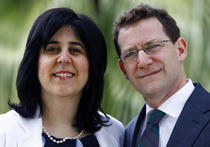
Psychology Professors Miriam and Howard Steele Discuss How Families can Cope with Grief and Stress During the Pandemic
The COVID-19 pandemic has created challenges that have affected and will continue to affect every aspect of life into the foreseeable future. The effect the crisis is having on parent-child relationships has rightfully received considerable attention now that families have been sheltering in place for more than two months.
Howard Steele and Miriam Steele are professors of psychology at The New School for Social Research and co-directors of the Center for Attachment Research. They are especially concerned about how family relationships are playing out when both children and parents are under enormous pressure.
“We take the view that we have information that parents and children and adolescents can find useful in coping with anxiety and stress,” says Howard Steele. “We know that securely attached adults and securely attached children are not immune to stress. The challenge is to feel able to acknowledge the stress and share one’s unsettling feelings with family members and close friends.”
Howard says that for children and parents with “attachment insecurities” (he estimates this group at 40 to 50 percent of the population), this can prove to be an especially trying period. A securely attached child “knows deep down that their problematic feelings will be heard by a sensitive and responsive caregiver,” Steele says.
“What’s the state of mind of my partner or parent?” he says those with insecure attachments will ask. “What’s going to happen to me if I share these feelings? Might it get worse? Might I be threatened by the person that I depend on? Might it not be better to keep this inside?”
Miriam Steele agrees that those with insecure parent-child relationships will experience more strain. She says it’s important that when explaining the pandemic to younger children, parents ought to be careful not to “catastrophize” the situation.
“You can say that the virus is worse than a cold and everybody is staying with family and everybody is staying inside,” she says. “For older children, you can use the virus as a science lesson to help them better understand what’s going on.”
Miriam was especially impressed by a recent CNN- and Sesame Street–hosted coronavirus town hall, where doctors answered questions from children and parents and Dr. Sanjay Gupta explained the importance of face masks and hand washing to Elmo.
“I thought that was a real innovation,” she says. “Parents could sit down and watch and get information that was accessible to children and entertaining for parents.”
The Steeles agree that during this period, parents should take pressure off children and allow plenty of time for play and recreation. Howard points to the joyful images he’s seen of children dancing and celebrating as a guide for parents to encourage fun and laughter when possible.
“Parents don’t have to run an entire school day; that’s just foolish,” Howard says. “I think it’s so useful during this time of quarantine to find occasions to move around. Children need recess.”
Miriam says that parents’ anxiety about children falling behind in their studies is understandable but that this is a time when the normal rules can be relaxed to ease pressure.
Another difficult issue facing parents during this time is how to explain to children about the death of a loved one, especially when the normal processes for grieving, such as going to funerals, wakes, or shiva observances, are prohibited.
“Everything has to be managed with social distancing guidelines in mind, which makes it important to share stories about the loved one that passed away,” Howard says. “Talk about lessons one has learned from that person and acknowledge loss and engage in a conversation about a life that was well-lived, the good things that we will remember about this family member who is no longer with us.”
Miriam believes that like the trauma caused by 9/11, the mental health issues surrounding the pandemic will affect some children for years to come and it’s important that as a society we be prepared for it. She’s concerned that economic disparities and budget cuts in mental health services could be problematic.
“There will be a huge increase in mental health difficulties for the kids who experience all of this,” she says.
Not surprisingly, the United Nations has joined other informed voices to declare a mental health crisis set in motion by the virus. The Steeles and their clinical psychology faculty at NSSR, will be delivering training in Mental Health and Substance Abuse Counseling, and Global Mental Health (at the MA level) and Clinical Psychology training. (at the doctoral level)
The Steeles recommend that those interested in finding out more should watch “How to Protect Young Children’s Mental Health During the COVID-19 Pandemic,” a video with Ozlem Bekar, PhD Clinical Psychology ’14, a former student and New York-based clinical psychologist.